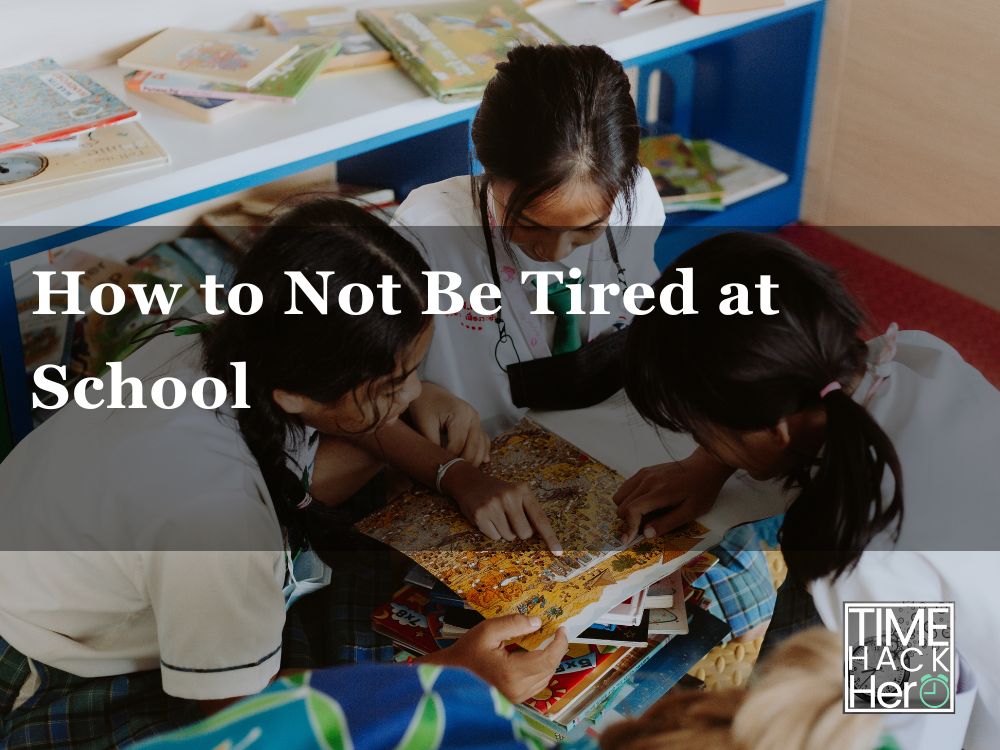Feeling drowsy and struggling to keep your eyes open during class is a common problem for students. Heavy academic workloads paired with early school start times leave many teens fighting fatigue throughout the day. Constant tiredness during school hours can negatively impact your learning, grades, concentration, and mood.
Instead of accepting exhaustion as inevitable, there are numerous science-backed strategies you can implement to help you feel more alert and energized throughout each school day. Here are the most effective ways to reduce school-related fatigue.
Table of Contents
Is Feeling Very Tired Normal?
It’s perfectly normal to feel a bit mentally drained or ready for a nap occasionally, especially right after lunch or in a warm classroom. However, if you regularly experience:
- Strong need to sleep during most classes
- Nodding off at your desk daily
- Difficulty concentrating or remembering lessons
This amount of fatigue likely results from an underlying issue needing to be addressed. Determining the causes will allow you to make the right changes to optimize energy levels.
Why Students Get Tired During School
Before covering how to combat school-related tiredness, it’s important to understand the key reasons you may get fatigued during the day in the first place:
1. Inadequate Sleep
Not getting enough nightly sleep is arguably the biggest reason for students feeling tired during school. Teens need 8-10 hours of sleep per night, but many average only 5-7 hours. Staying up late to finish homework, binge watch shows, text friends, and scroll social media results in insufficient rest. Just a few consecutive nights of limited sleep builds a “sleep debt” that’s hard to recover from within the confines of the school week.
2. Early School Start Times
Research confirms most teens experience a natural delay in their circadian rhythm that shifts their ideal sleep-wake cycle later. But early school start times – usually between 7-8am – force students to wake up much earlier than their internal body clocks want. Just a 30 minute to 1 hour later start time results in significantly less student sleepiness. Forced early rise times mismatch teens’ sleep needs.
3. Heavy Cognitive Workload
Expending sustained mental energy for hours of intense concentration wears down the brain’s resources. The constant thinking and focus required during back-to-back lessons is mentally draining. It’s understandable students hit an afternoon slump after a full morning of academic demands.
4. Physical Inactivity
Sitting for prolonged periods leads to reduced blood flow and oxygenation to the brain, resulting in mental fog. Most students sit nearly all day aside from passing periods, leading to a largely sedentary lifestyle. This built-up inactivity inhibits cognitive arousal and energy.
5. Poor Nutrition
Eating a diet low in protein, fiber and healthy fats but high in processed carbs and sugar leads to destabilized energy levels. Blood sugar crashes from poor nutrition contribute to mid-day school sleepiness. Dehydration from insufficient water intake also worsens fatigue.
6. Medical Factors
Certain health issues like sleep disorders, anemia, thyroid dysfunction, asthma, depression and some medications can exacerbate daytime sleepiness. It’s wise to rule out any medical contributors.
Recognizing what’s behind your school-related tiredness empowers you to proactively combat it.
Consequences of Feeling Tired During School
Succumbing to drowsiness during lessons can negatively impact:
- Poorer retention and comprehension of class material
- Lower quiz and test performance
- Declining grades and falling behind academically
- Difficulty participating fully in class activities
- Strained relationships with teachers and peers
- Missing important class announcements
- Increased risk of driving drowsy after school
Don’t accept feeling tired throughout school days as inevitable! Taking proactive steps to boost wakefulness will serve you better academically and socially.
Solutions to Avoid Feeling Tired During School
If you regularly feel drained instead of energized for learning, try these strategies:
Prioritize Sleep
Aim for 8-10 hours of quality sleep each night by sticking to a regular bedtime/wake time schedule. Limit electronics before bed, avoid caffeine after lunch, and create an ideal restful sleep environment.
Eat Nutritious Foods
Fuel up with regular healthy meals and snacks full of protein, fruits, veggies, complex carbs and healthy fats. Stay hydrated with water throughout the day. Avoid excess sugar which leads to crashes.
Reduce Stress
Make time for relaxing activities you enjoy each day to manage anxiety or worries. Consider joining a school club, learning mindfulness techniques, or seeing a counselor if stress is chronic.
Schedule Breaks
Make sure to build in short breaks between classes, homework sessions, and extracurriculars. Even 10-15 minutes to recharge helps regain focus and energy.
Limit Extracurriculars
Cut back on nonessential social, sport, or arts commitments if your schedule is completely overloaded. Allow enough time for schoolwork, sleep, healthy meals and downtime. Know your limits.
See Your Doctor
Discuss any fatigue, sleep issues, diet, stress levels or suspected health problems. Identify and properly treat any underlying conditions contributing to low energy.
With some balancing of school demands and daily energy habits, you can feel alert and ready to concentrate during lessons. Don’t ignore persistent exhaustion – take steps to nourish your body and mind.
Frequently Asked Questions
1. How much sleep should a high school student get?
The recommended amount for optimal health, academic performance and daytime energy is 8-10 hours per night. Prioritizing consistent, high-quality sleep is key to avoiding fatigue, concentration issues and difficulties learning during school.
2. What’s the best morning routine before school?
Wake up early enough to avoid rushing. Eat a balanced breakfast with protein, complex carbs and fruit. Hydrate with water. Get dressed, brush your teeth, and pack up. Avoid too much caffeine. Engage in movement or meditation.
3. What snacks help beat fatigue during school?
Good snacking options include nuts, apples with peanut butter, carrots and hummus, Greek yogurt, hard boiled eggs, bananas, edamame, granola bars, berries, and avocado toast. Combine complex carbs, fiber and protein for sustained energy levels.
4. How can I catch up on sleep when school nights are busy?
Limit smartphone use and get to bed earlier on weekends to compensate for lost sleep during busy workweeks. Take brief naps or rest breaks on less hectic weekend days. Maintain sleep consistency as much as possible.
5. Are energy drinks OK for avoiding tiredness during school?
No, heavily caffeinated drinks can disrupt sleep and are unhealthy for teens. Stay hydrated with water and fuel up with healthy balanced meals and snacks instead of relying on artificial stimulants which cause energy crashes.
Conclusion
Feeling worn out during school makes learning a struggle. Prioritize adequate nightly sleep, nutritious diet, mental health support, limited after school commitments, and physical activity. See a doctor if fatigue persists despite lifestyle changes. Take steps to nourish your body and mind so you can thrive as a student.









